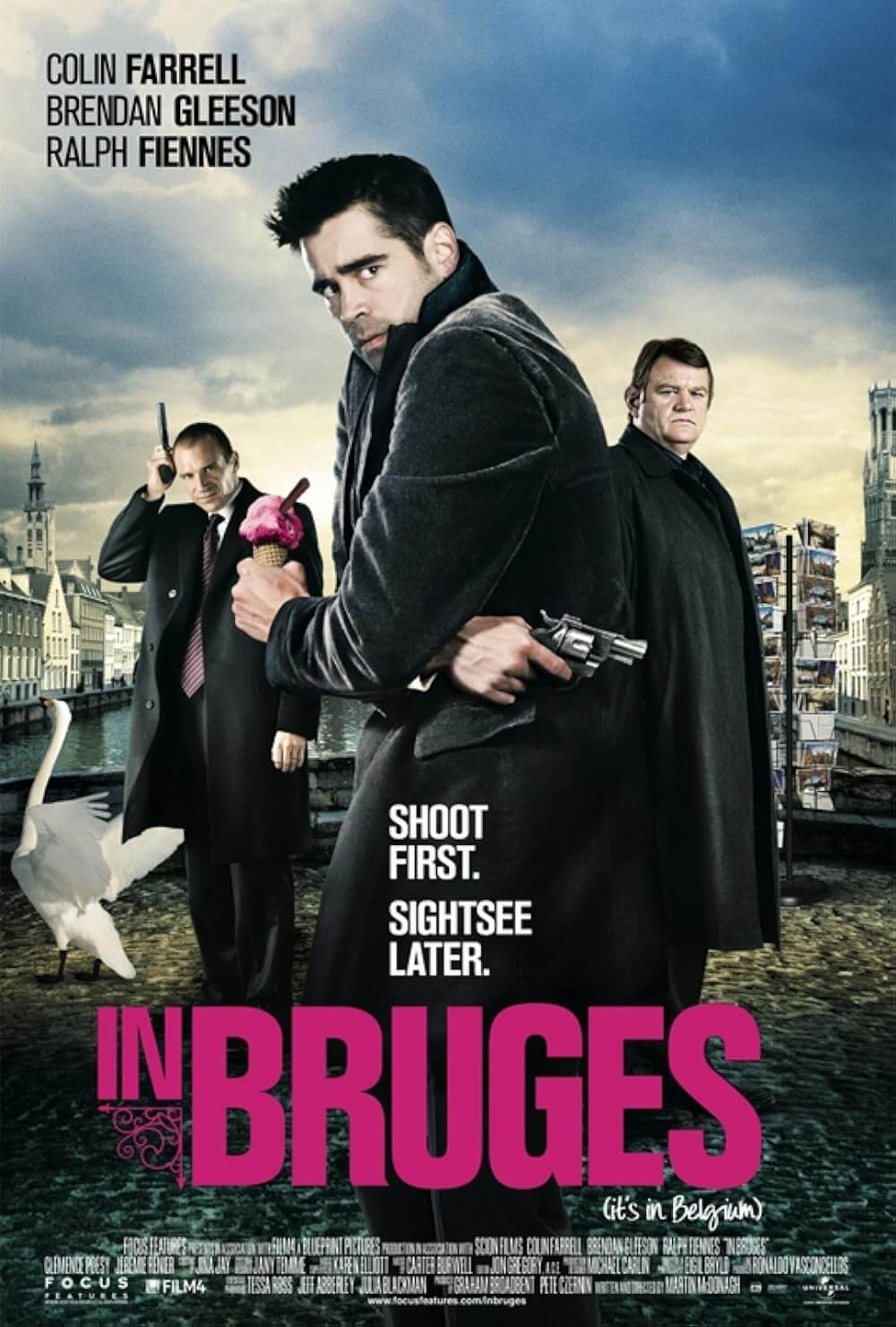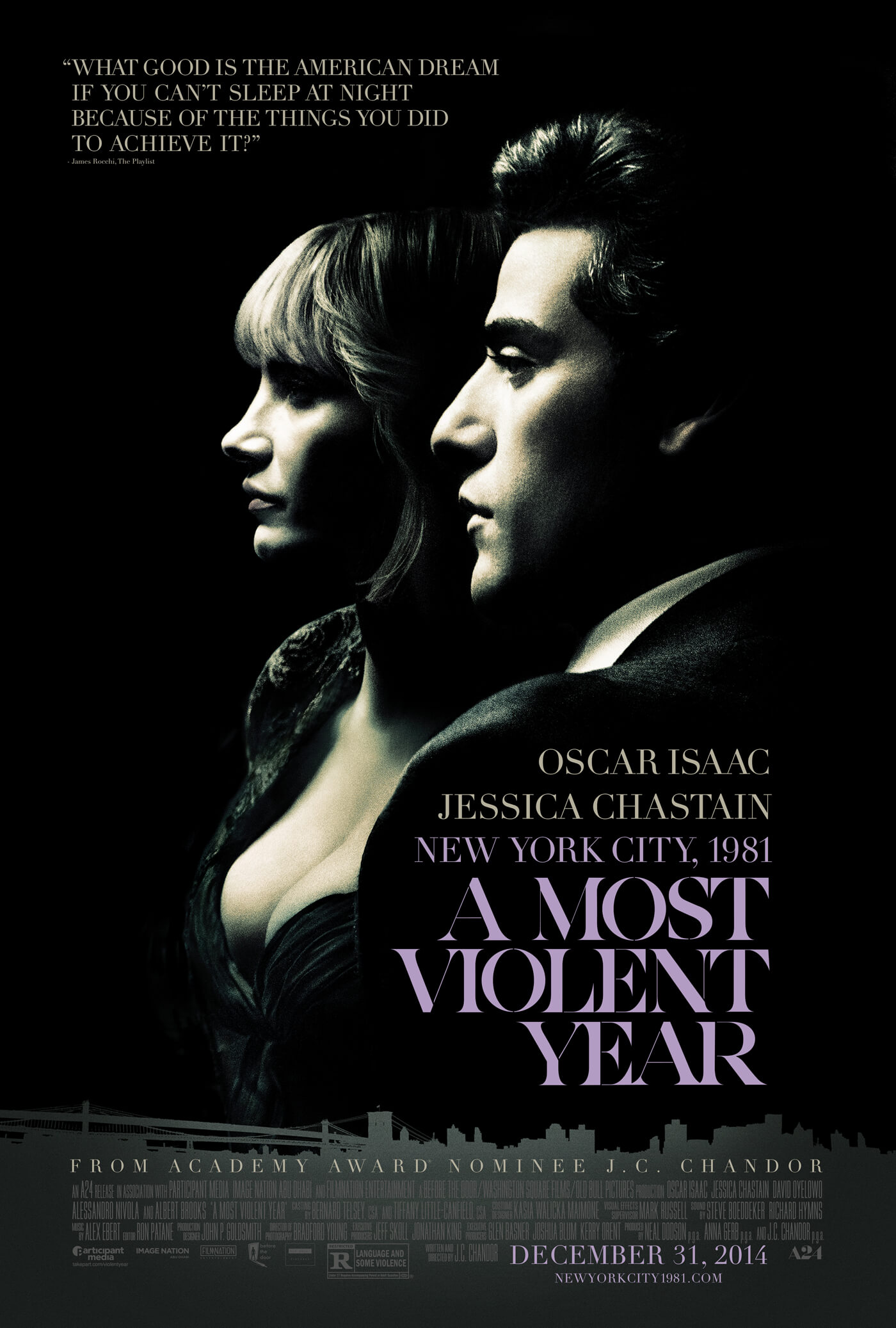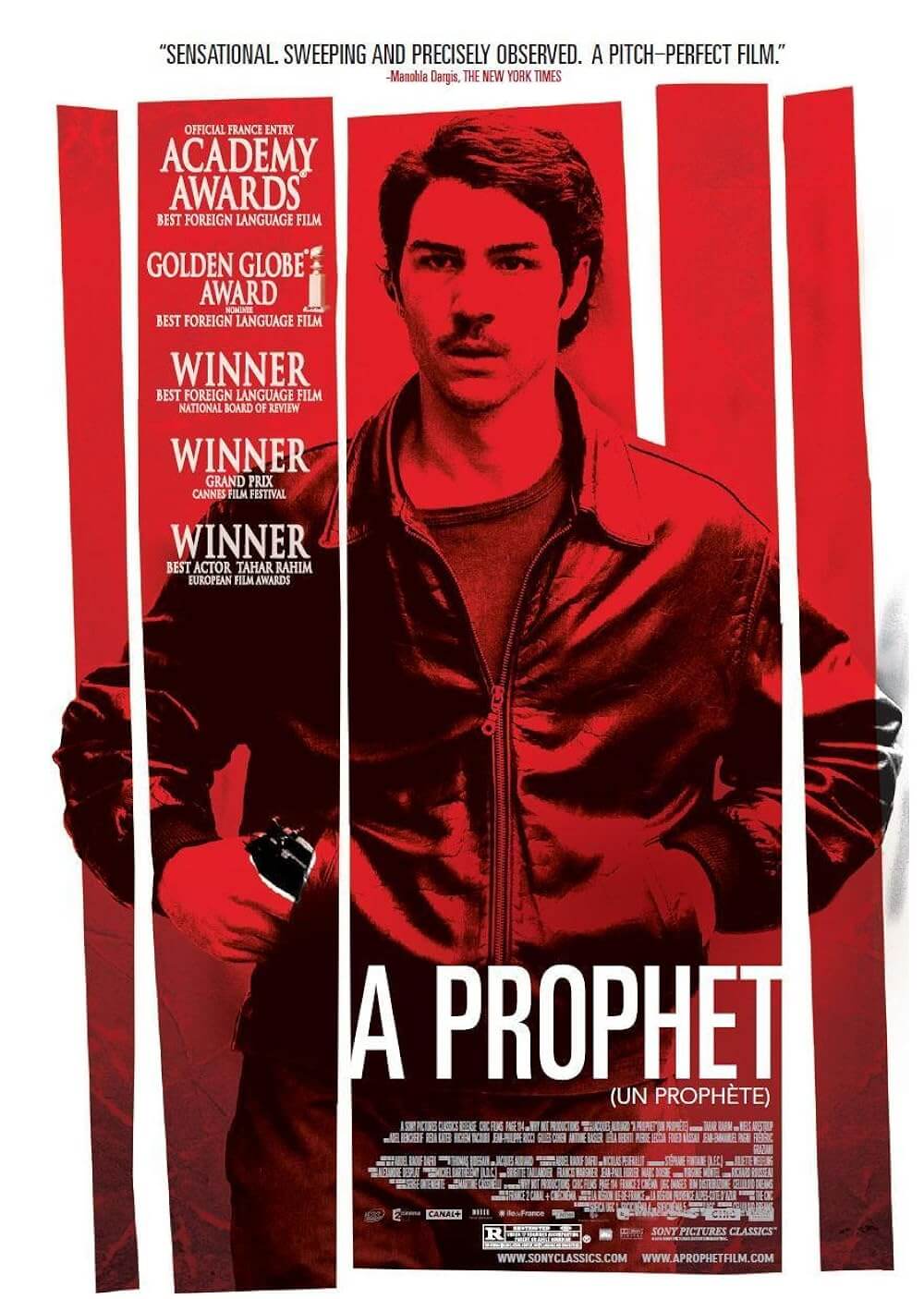The Definitives
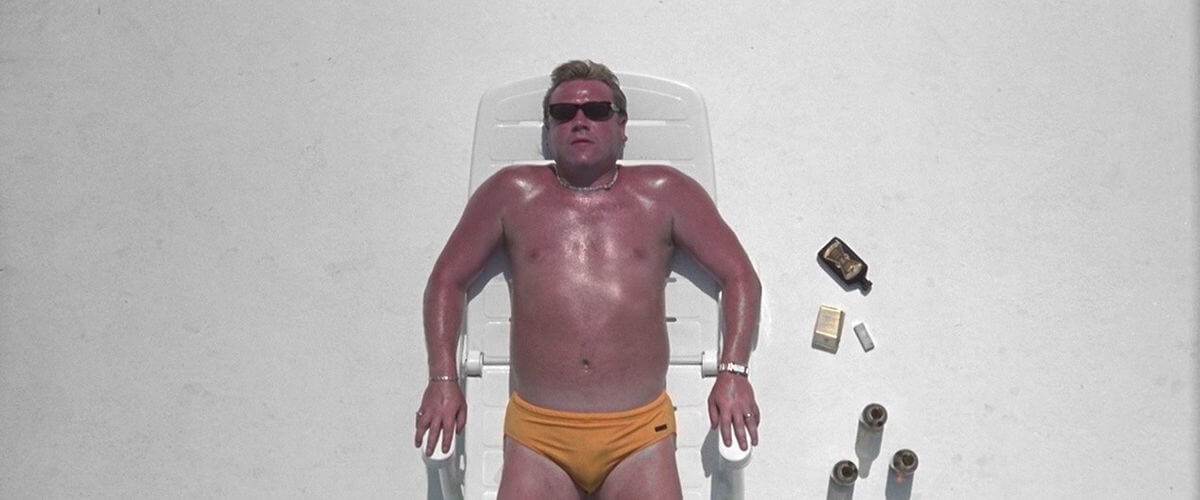
Sexy Beast
Essay by Brian Eggert |
Gal Dove’s Spanish hacienda is a place of leisure. He sunbathes poolside like a lizard roasting on a desert rock, his skin achingly tan and leathered, his movements plodding. The heat burns so good. “Bloody hell,” he says to himself. “You can fry an egg on my stomach… Tremendous.” How many professional thieves actually withdraw from the life and escape to their very own sun-soaked getaway? This one has. And retirement, following his nine-year stretch in prison, is a lazy paradise. His waistline confirms as much. Except his former life comes rolling back, just missing him, over his shoulder as it were, and into the pool. A boulder the size of, well, a boulder, rolls down the hillside and explodes the surface of the water, cracking his double-heart-shaped tiles at the pool’s bottom. No physical metaphor could be a more appropriate harbinger for Don Logan, that primal sonofabitch, that coarse and acid-tongued bully from Gal’s former life in London. Logan marches through the airport with a boulder’s momentum, the wavy vein on his shaven scalp as prominent and pulsating as his march, racing toward Gal and his Costa Brava hacienda to convince—no, convince is the wrong word—tell Gal to take part in the proverbial “one last job,” a job Gal neither needs nor wants. Gal could simply tell Don he won’t do it. That’s something he can do. But trying to refuse Don Logan is about as practical as telling a boulder to stop rolling downhill.
Of all the films about professional thieves and gangsters, British or otherwise, none is as deliciously peculiar or filled with as uncommon a style as Sexy Beast, director Jonathan Glazer’s first feature. Our first indication of the film’s uniqueness is how little attention is paid to criminal detail, how this entry in the buoyant British crime subgenre revolves not around the much-discussed heist, nor even around shootouts or the criminal organization. This is not a classic Basil Dearden caper or even a rompish postmodern gem by Guy Richie, but rather a curious blend of dark David Lynch imagery and introspective character examination—the depths of its characters and their innermost fears and lows. Central to this investigation are Gal, played by Ray Winstone in an ultra-cool performance of effortless presence, and the sharply contrasting and Oscar-nominated turn by Ben Kingsley as the caustic Don Logan, an unforgettably malicious bastard whose existence is a bane to everyone onscreen. In spite of the widely explored arena of British crime pictures, Glazer’s inspired handling of multiple dream sequences and the careful treatment of the resonant characters leave Sexy Beast a sharp and creative marriage of style and substance.
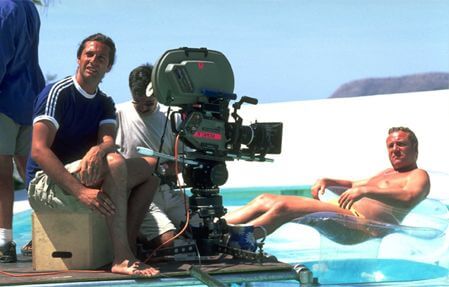 Before becoming a filmmaker whose measured visualist approach has earned many comparisons to the stylistic austerity of Stanley Kubrick, Glazer had a very average upbringing. He grew up in a Jewish home in the suburban English neighborhood of Hadley Wood and, with his film aficionado father, explored cinema, particularly the films of David Lean. After attending Nottingham Trent University for theater design, Glazer edited together promotional trailers for both movies and BBC television. He went on to a widely celebrated (and still practiced) career making commercials, notably for Guinness, Nike, and Stella Artois. But it was his award-winning efforts in music videos (for Massive Attack, Jamiroquai, and Radiohead) that brought about discussions for his first full-length motion picture from a script by Louis Mellis and David Scinto, entitled Gangster No. 1. He turned down the project after clashing with producers over the casting (director Paul McGuigan eventually made the film in 2000 starring David Thewlis, Paul Bettany, and Malcolm McDowell). But Mellis and Scinto had written another script called Sexy Beast, and the three resolved to develop that instead.
Before becoming a filmmaker whose measured visualist approach has earned many comparisons to the stylistic austerity of Stanley Kubrick, Glazer had a very average upbringing. He grew up in a Jewish home in the suburban English neighborhood of Hadley Wood and, with his film aficionado father, explored cinema, particularly the films of David Lean. After attending Nottingham Trent University for theater design, Glazer edited together promotional trailers for both movies and BBC television. He went on to a widely celebrated (and still practiced) career making commercials, notably for Guinness, Nike, and Stella Artois. But it was his award-winning efforts in music videos (for Massive Attack, Jamiroquai, and Radiohead) that brought about discussions for his first full-length motion picture from a script by Louis Mellis and David Scinto, entitled Gangster No. 1. He turned down the project after clashing with producers over the casting (director Paul McGuigan eventually made the film in 2000 starring David Thewlis, Paul Bettany, and Malcolm McDowell). But Mellis and Scinto had written another script called Sexy Beast, and the three resolved to develop that instead.
British crime and gangster films were a firmly established subgenre when Sexy Beast finally arrived in 2000 and had just been reinvigorated in 1998 by the popularity of Ritchie’s energetic, post-Tarantino riff Lock, Stock, and Two Smoking Barrels (followed by Snatch in 2001 and Rocknrolla in 2008). But traditionally, the British crime film serves as a social reflector, and as such has a long and textured history of gritty, poignant films of intense substance—a most pronounced example being Deardon’s The League of Gentlemen (1960), which followed a group of British ex-soldiers who turn to crime when sacked by their government’s military downsizing. Mike Hodges’ 1971 original Get Carter established Michael Caine as a British tough guy, a persona he reclaimed in 2009’s Harry Brown, the latter film addressing the rampant crime in council estate complexes. Likewise, the career of Bob Hoskins was redefined when Neil Jordan cast him as a sympathetic crook in Mona Lisa (1986) after his breakthrough role as a ruthless crime lord in The Long Good Friday (1980), a film that directly echoed the Thatcher-era drive to redevelop London’s Docklands. And with other examples such as Stephen Frears’ The Hit (1984), Carol Reed’s Odd Man Out (1947), and the recent 2009 adaptations of David Peace’s Red Riding books, the British crime film earns its association with stories of intense character depth.
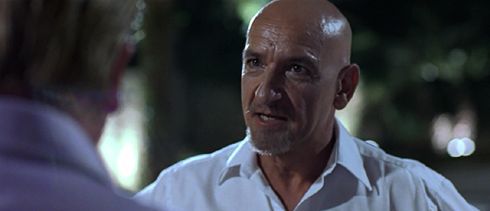 Sexy Beast advances this association to new heights. After the boulder rolls downhill, over his shoulder, and into his pool, spoiling his blissful afternoon relaxation set to “Peaches” by The Stranglers, former thief Gal goes about life as he has since his retirement. He spends his days lying poolside, getting drunk and having a laugh, and wandering about with friends. As people remark later in the film, his once trim physique has been softened by the everyday holiday that is his life. He’s devotedly in love with his spouse Deedee (Amanda Redman), and he has a fatherly friendship with local pool boy Enrique (Álvaro Monje). In the evening, it’s dining out with Deedee and close friends Aitch and his wife Jackie (Cavan Kendall and Julianne White). But tonight Aitch and Jackie arrive at dinner with grave expressions, not their usual selves. The trouble is, Don Logan called Jackie—Jackie being a former sexual conquest and current infatuation of Don’s—and announced his impending arrival and intent to enlist Gal to take part in the heist of a private London bank. Gal’s joviality, which up until now couldn’t be spoiled by a boulder crashing into his pool, subsides. His face grows wary, frightened even. Indeed, long before Kingsley’s character confronts Gal and friends, he’s discussed and worried over, hated and feared. Gal maintains that he’ll refuse Don, but everyone else at the table wonders how he’ll manage it. Don Logan doesn’t take “no” for an answer.
Sexy Beast advances this association to new heights. After the boulder rolls downhill, over his shoulder, and into his pool, spoiling his blissful afternoon relaxation set to “Peaches” by The Stranglers, former thief Gal goes about life as he has since his retirement. He spends his days lying poolside, getting drunk and having a laugh, and wandering about with friends. As people remark later in the film, his once trim physique has been softened by the everyday holiday that is his life. He’s devotedly in love with his spouse Deedee (Amanda Redman), and he has a fatherly friendship with local pool boy Enrique (Álvaro Monje). In the evening, it’s dining out with Deedee and close friends Aitch and his wife Jackie (Cavan Kendall and Julianne White). But tonight Aitch and Jackie arrive at dinner with grave expressions, not their usual selves. The trouble is, Don Logan called Jackie—Jackie being a former sexual conquest and current infatuation of Don’s—and announced his impending arrival and intent to enlist Gal to take part in the heist of a private London bank. Gal’s joviality, which up until now couldn’t be spoiled by a boulder crashing into his pool, subsides. His face grows wary, frightened even. Indeed, long before Kingsley’s character confronts Gal and friends, he’s discussed and worried over, hated and feared. Gal maintains that he’ll refuse Don, but everyone else at the table wonders how he’ll manage it. Don Logan doesn’t take “no” for an answer.
Upon Don’s arrival, we quickly realize his approach is not one of dignified intimidation, as we might expect from a feared and much-talked-about gangster, but rather incessant bullying. Don’s coarse manners and foul-language grate on everyone, his expressed and liberal use of the dreaded word “cunt” resounding, as he hounds Gal endlessly to do the job. His tactic to convince Gal consists of streaming beratements and shouting; he hurls insults at anyone and everyone in sight until their resolve is broken. (“Shut up, cunt. You louse. You got some fuckin’ neck ain’t you? Retired? Fuck off, you’re revolting. Look at your suntan… it’s like leather man, your skin. We could make a fucking suitcase out of you. Like a crocodile, fat crocodile. Fat bastard. You look like fucking Idi Amin.” And so on. But Gal wants to maintain his retirement bliss even more than he fears Don’s barking and mild beatings. He suffers seemingly endless indignation, though his endurance is not in vain. Don finally gives up and heads to the airport. Gal, Deedee and the rest breathe a sigh of relief. On the plane before takeoff, Don lights up a cigarette. You must ask yourself, Who in their right mind lights a cigarette on an airplane? Don Logan—because he wants to get kicked off the flight. He wants a reason to go another round with Gal. When Don returns to the hacienda, everyone has had enough. And soon it turns violent, and Don is no more.
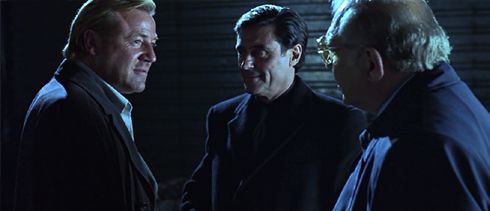 With this, Gal arrives in London to carry out the proposed job, so as not to arouse suspicion with the bosses. Don, he maintains, flew back from Spain the day before; and perhaps going too far, Gal even claims Don called from Heathrow to confirm his safe arrival. The heist’s black-haired, icy-eyed mastermind Teddy Bass (Ian McShane) remains chary. Don never arrived, of course, and so Teddy questions Gal about Don’s visit, and then questions him again. All Gal has to do is get through the job—an elaborate underwater spectacle, which involves drilling through several feet of concrete and brick into a safety deposit box vault—collect his money, and go home. His nerves make that progressively more difficult. The normally composed Gal appears reticent. Glazer spends little time on the heist itself, which may have been Sexy Beast’s centerpiece if it was a more conventional story, and instead dwells on the anticipation and aftermath. When it’s done, Teddy takes Gal to the airport; but before the drop-off, he detours to the home of his inside man (James Fox) and executes him in front of Gal, who maintains his story about Don despite the pressure. After all, Gal withstood Don Logan’s brand of intimidation. He can hold out against anything.
With this, Gal arrives in London to carry out the proposed job, so as not to arouse suspicion with the bosses. Don, he maintains, flew back from Spain the day before; and perhaps going too far, Gal even claims Don called from Heathrow to confirm his safe arrival. The heist’s black-haired, icy-eyed mastermind Teddy Bass (Ian McShane) remains chary. Don never arrived, of course, and so Teddy questions Gal about Don’s visit, and then questions him again. All Gal has to do is get through the job—an elaborate underwater spectacle, which involves drilling through several feet of concrete and brick into a safety deposit box vault—collect his money, and go home. His nerves make that progressively more difficult. The normally composed Gal appears reticent. Glazer spends little time on the heist itself, which may have been Sexy Beast’s centerpiece if it was a more conventional story, and instead dwells on the anticipation and aftermath. When it’s done, Teddy takes Gal to the airport; but before the drop-off, he detours to the home of his inside man (James Fox) and executes him in front of Gal, who maintains his story about Don despite the pressure. After all, Gal withstood Don Logan’s brand of intimidation. He can hold out against anything.
In this sense, Sexy Beast is very much about Gal’s state of mind, his fear of capture, and his desire to do whatever it takes to sustain his retirement bliss. Although this would prove appropriately introspective for a British crime film, Glazer’s dream sequences represent Gal’s anxiety through outstanding visuals that, in this instance, have less in common with Kubrick than the energized surreality of Danny Boyle (Trainspotting). Gal’s dreams first manifest the night after he learns about Don’s arrival. A blending of the day’s events, rabbit hunting and dining out, Gal’s dream finds him at a restaurant table in the Spanish desert. All at once his meal is interrupted by a bipedal man-rabbit with an Uzi. This frightening inner demon seems to symbolize Gal’s intimidating criminal Self, buried deep after his retirement and awakened by his trembling fear of Don. Perhaps the demon is less an image of Don than what Don signifies—an unavoidable return to a life of crime Gal does not desire, a threat to his idyllically wasted days at the hacienda. Now dead, Don Logan is the personification of that threat; his death certainly more dangerous than Gal’s own demons, as the final shots twisting inside of Gal’s mind suggest. The frame reels through Gal’s brain and arrives underground in a graveyard hole, where his grotesque demon cracks through a casket to find Don smoking. But Don is indifferent and unfazed by the growling, furious creature before him.
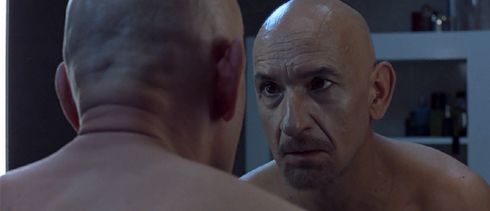 Sexy Beast also pulls a great deal of dynamism from the audacity of casting Ben Kingsley in his role. Often associated with his Oscar-winning turn as the titular Mahatma in Richard Attenborough’s biopic Gandhi (1982), Kingsley struggled to shed that connotation in the decades following. The knighted actor had played a particularly despicable character in Roman Polanski’s Death and the Maiden (1994), but his reputation, which continued to grow more diverse after this 2000 release, broke through on Glazer’s film. Kingsley’s performance destroys our perception of the actor. His continued snarling and violence toward Gal (though he insists “Talk to me. I’m here for you.”), and his persistent use of “cunt” and “fuck,” further shake out his former standing until Gandhi is the furthest notion from our minds. The impetus and thick-accented quality of Kingsley’s delivery are completely unhinged and ferocious, unlike anything else in his body of work, and the performance deserves comparison to Joe Pesci’s likewise Oscar-nominated turn in Goodfellas (1989). But Don Logan is not merely a bully. His scene in the bathroom mirror as he rationalizes his approach to convince Gal, and his refusal to admit his obsession with Jackie, reveals a much more disturbed individual in a Gollum-like inner debate—perfectly punctuated when he intentionally turns mid-urination to soil Gal’s bathroom floor.
Sexy Beast also pulls a great deal of dynamism from the audacity of casting Ben Kingsley in his role. Often associated with his Oscar-winning turn as the titular Mahatma in Richard Attenborough’s biopic Gandhi (1982), Kingsley struggled to shed that connotation in the decades following. The knighted actor had played a particularly despicable character in Roman Polanski’s Death and the Maiden (1994), but his reputation, which continued to grow more diverse after this 2000 release, broke through on Glazer’s film. Kingsley’s performance destroys our perception of the actor. His continued snarling and violence toward Gal (though he insists “Talk to me. I’m here for you.”), and his persistent use of “cunt” and “fuck,” further shake out his former standing until Gandhi is the furthest notion from our minds. The impetus and thick-accented quality of Kingsley’s delivery are completely unhinged and ferocious, unlike anything else in his body of work, and the performance deserves comparison to Joe Pesci’s likewise Oscar-nominated turn in Goodfellas (1989). But Don Logan is not merely a bully. His scene in the bathroom mirror as he rationalizes his approach to convince Gal, and his refusal to admit his obsession with Jackie, reveals a much more disturbed individual in a Gollum-like inner debate—perfectly punctuated when he intentionally turns mid-urination to soil Gal’s bathroom floor.
Though Kingsley threatens to steal the film, Ray Winstone’s more understated performance carries the film’s soul. Winstone, like Kingsley, is a master of presence, but less as a result of his chameleon-like ability to play any range of characters. Quite simply, he’s a fascinating onscreen specimen of “sexual magnetism” as one critic observed. His gravelly voice and turtle-speed movements in the film exude untold charisma. His Gal Dove is tantamount to James Gandolfini’s Tony Soprano in his more searching moments, and his character’s deep humanity and love for Deedee encapsulates the surprising emotional core of Sexy Beast. Before Don Logan’s name is ever mentioned, Gal slips away into a heavenly reverie that Glazer sets to Dean Martin’s “Sway,” he and Deedee floating above Costa Brava in a kiss. Gal’s unshakable need to actively love Deedee and protect her from Don, who’s quick to degrade her former sexual promiscuity and status as an ex-adult film star, is lovable. With Deedee not speaking to Gal for his choice to cover his tracks and carry out the heist, Gal calls her on the phone from London and whispers in an endearingly humble and almost pathetic poetry: “I love you like a rose loves rainwater, like a leopard loves its partner in the jungle, like… I don’t know what like.”
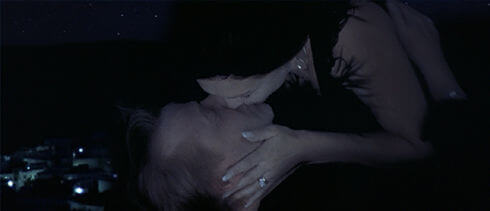 Many critics and film scholars, even the director himself, argued later that Jonathan Glazer’s talent improved in his subsequent films Birth (2000) and Under the Skin (2014), and matured beyond his first effort—that Sexy Beast served as merely a rudimentary testing ground for Glazer’s otherwise polished craft. And yet, there’s something appealing about the film’s sometimes clumsy energy, where a stylistic flourish doesn’t require an advanced intellectual metaphor because there’s feeling behind it, regardless of whether that feeling is Don’s hatred or Gal’s immovable love. Although it may be unintended, Glazer’s evident enthusiasm behind the camera exemplifies Gal’s impassioned, unpretentious love for his wife. Whereas the film’s contemporary counterparts lose themselves in twisting plots and punchy scenarios, what makes Sexy Beast unforgettable and distinct within its subgenre is its human quality. The sincerity of Gal’s affection is as potent as Don’s vile nature in Sexy Beast’s skewed polarization of romantic and misanthropic men, and this conflict, uncharacteristic in a British crime film, remains the picture’s lasting quality.
Many critics and film scholars, even the director himself, argued later that Jonathan Glazer’s talent improved in his subsequent films Birth (2000) and Under the Skin (2014), and matured beyond his first effort—that Sexy Beast served as merely a rudimentary testing ground for Glazer’s otherwise polished craft. And yet, there’s something appealing about the film’s sometimes clumsy energy, where a stylistic flourish doesn’t require an advanced intellectual metaphor because there’s feeling behind it, regardless of whether that feeling is Don’s hatred or Gal’s immovable love. Although it may be unintended, Glazer’s evident enthusiasm behind the camera exemplifies Gal’s impassioned, unpretentious love for his wife. Whereas the film’s contemporary counterparts lose themselves in twisting plots and punchy scenarios, what makes Sexy Beast unforgettable and distinct within its subgenre is its human quality. The sincerity of Gal’s affection is as potent as Don’s vile nature in Sexy Beast’s skewed polarization of romantic and misanthropic men, and this conflict, uncharacteristic in a British crime film, remains the picture’s lasting quality.
Bibliography:
James, Nick, “Thieves on the Verge of a Nervous Breakdown,” Sight and Sound, Jan. 2001, pp. 19-20.
Olsen, Mark, “Discovery. Jonathan Glazer,” Film Comment, March/April 2001, pp. 16-17.
Forshaw, Barry. British Crime Film: Subverting the Social Order. New York: Palgrave Macmillan, 2012.
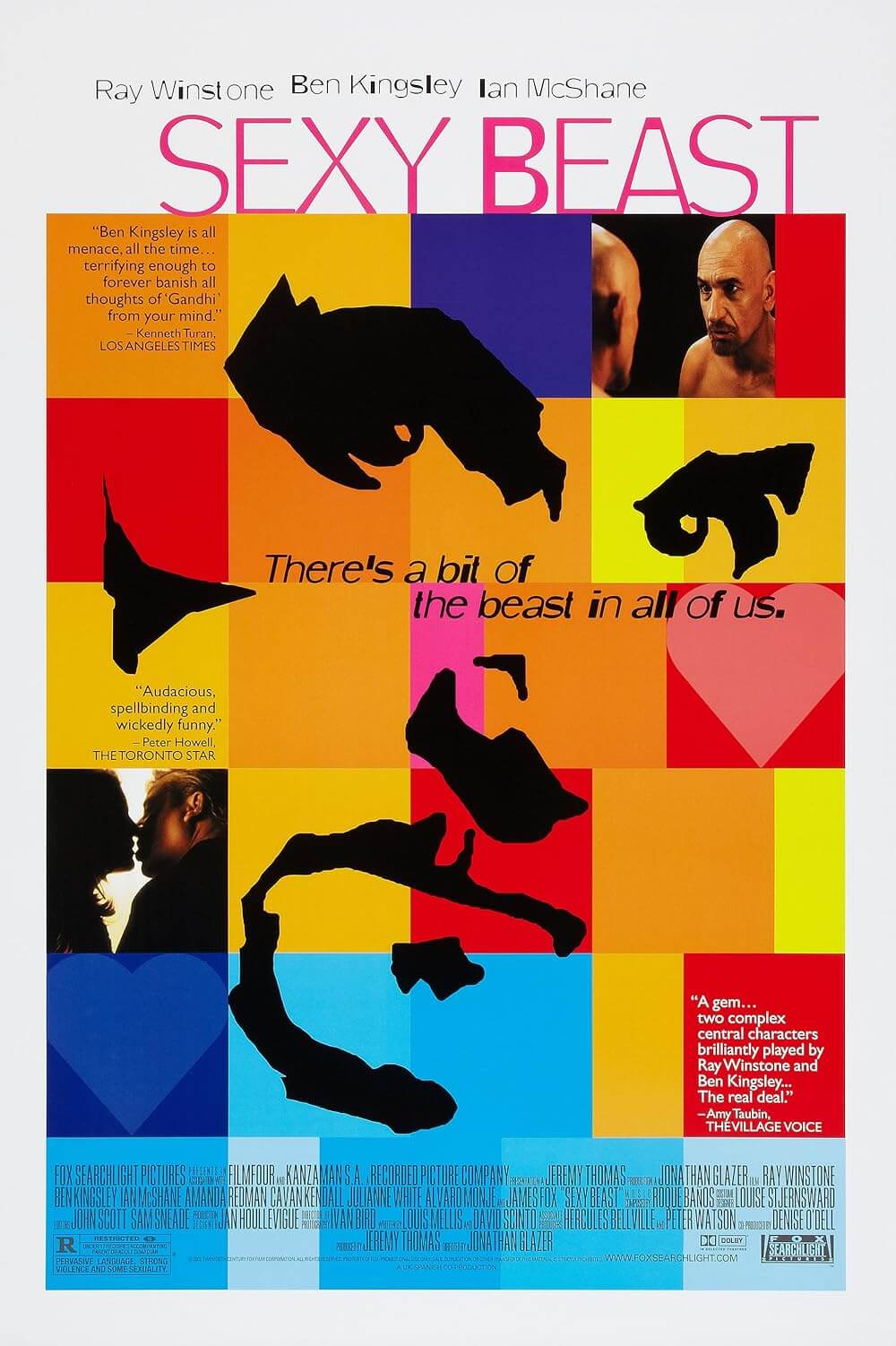
Unlock More from Deep Focus Review
To keep Deep Focus Review independent, I rely on the generous support of readers like you. By joining our Patreon community or making a one-time donation, you’ll help cover site maintenance and research materials so I can focus on creating more movie reviews and critical analysis. Patrons receive early access to reviews and essays, plus a closer connection to a community of fellow film lovers. If you value my work, please consider supporting DFR on Patreon or show your support in other ways.
Thank you for your readership!
Brian Eggert | Critic, Founder
Deep Focus Review


